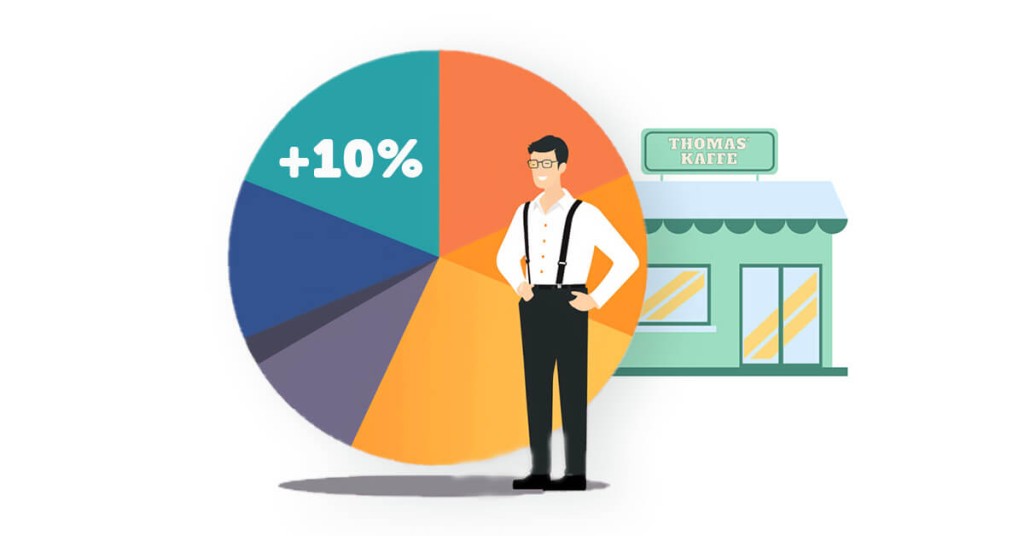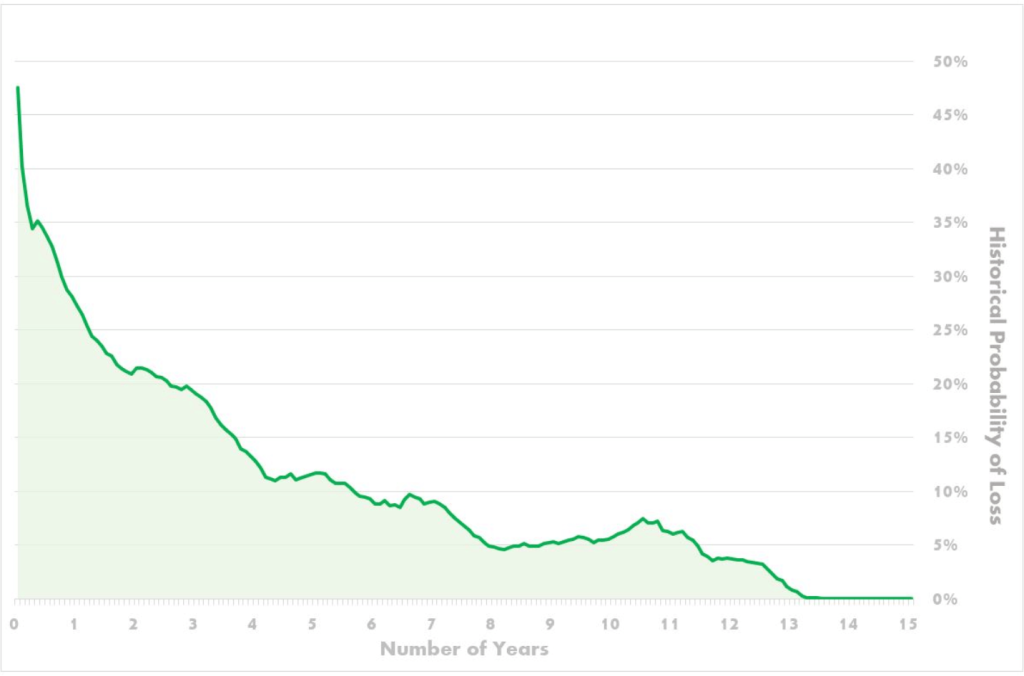Are you brand new to stock investing? In this article, you will discover what you need to think about before investing in stocks.
I have tried to put together a 'Stock investing for beginners guide', which covers important areas of investment that you must know if you are going to buy and sell shares and funds.
Investing in stocks can seem a bit intimidating for beginners. Imagine if you make a wrong investment and lose everything?
It is to avoid this, while increasing the probability of making money from stocks this article aims to solve.
Here you will find out what you need to make wise, well-thought-out choices in the stock market.
- What is stocks?
- Benefits of investing in stocks
- Two useful tools for stock analysis
- Where can I buy stocks?
- How does the stock market work?
- Stocks VS funds
- Things you must know when investing in stocks
- How to earn money on stocks
- "Time in the market over timing the market"
- Analysing stocks for beginners
- The company's fundamental characteristics
- Valuating stocks
- Get started with buying stocks and funds today at Nordnet
Because with the right knowledge, stock investing can actually be an exciting and lucrative journey. This comprehensive guide is designed to give you all the information you need to get started with stock investing.
We will browse through many different topics, so hold on!
And, by the way, I have written several detailed articles on the various topics we come across. I have linked to these in this guide, so that you can easily read more about a topic that interests you more.
Planning to start investing in stocks or funds? Then I recommend that you create free user at Nordnet, and make use of all the wonderful learning resources such as Shareville, the joint school and Pengepodden.

See the top investors' favorite books
An overview of hundreds of books recommended by the world's best investors.
What is stocks?
Before we dive into the details – let's first understand what stocks really are.
Shares represent ownership in a company, and give you an ownership stake in a business.
Yes, when you buy shares in a company, you actually become a co-owner and are thus entitled to a share of the company's earnings and value.
This means, in short, that if a company does well and makes more money year after year, this will be reflected in the share price and any dividends and buybacks - which means that you as an investor make money.
We will return to both dividends and buybacks later in this article.
Benefits of investing in stocks
First things first: It's a good thing that you want to invest in stocks! Not only do you take part in and support the business world - you also get a number of other benefits by investing in the stock market:
1. You get a return on your investment
Over time, stocks have proven to be a smart place to put your money. On average, an index fund, for example, has given you around 10 percent annual returns over the past 30 years.
If you had invested $10,000 in 1990, this sum with this percentage return would be around $217,000 today (source: officialdata.org).
Even more can be achieved by investing in individual shares, but then you also need to have the knowledge to make the right investment decisions - which you will be able to read more about in this guide.
Read also: Where can I buy S&P 500?
2. You build wealth over time
Another benefit of investing in stocks is that you grow your wealth for the future. When you invest in shares and funds, and sit on your hands, historically the value of these has increased over time.
It will ultimately give you greater financial security and help you achieve your goals, whether we're talking about buying a house, retirement or your children.
In other words, as long as you take your time and do nothing, it may be possible to become quite so stock rich.
3. A great way to diversify your portfolio
One of the great benefits of investing in the stock market is that it helps you spread your money across different asset classes, companies, industries and markets. The purpose of this is to distribute risk and potential returns in several areas, so you have some in property, some in gold, some in shares and so on.
That way, all your money is not lost if an investment should do poorly.
4. Easy and flexible to get started
Another advantage of equity investment over, for example, investment in property, is the threshold for getting started. You can invest what you can afford, whether it is a few a few hundred dollars a month or more, to start building your wealth.
Two useful tools for stock analysis

I recommend Finchat.io to you who are serious about investing in individual shares, who want detailed information on companies' key figures. You also get access to an AI chat dedicated to finance. Even professional investors use FinChat, and if you're a graph lover, this is for you.

Simply Wall St is for you who want to be served a simple overview of a company, in addition to getting their 'intrinsic value' via the cash flow method. It gives you a clue as to whether you are buying an underpriced or overpriced share - in a simple visual way.
Where can I buy stocks?
In order to buy stocks, you have to have an investment account, either in your online bank, if they have an online broker, or with a dedicated online broker such as Nordnet.
I myself started easily in DNB's own share platform,but if I were to recommend something to a beginner today, I would recommend Nordnet.
The reason for that is the much larger selection of shares, funds and ETFs, a more detailed dashboard, and dividend information no one else on the market can match.

Get started with investing at Nordnet
I recommend Nordnet because of their large selection of shares and funds, low fees, good learning resources + free access to the share forum Shareville (ad).
How does the stock market work?

The stock market is where the shares are traded.
The stock market is a place where buyers and sellers meet (digitally) to trade shares. The prices of shares are determined by supply and demand.
When more people want to buy shares in a company than are available, the price increases. And when there are more people who want to sell shares than buy them, the price falls.
Mr. Market
Investor legend Warren Buffett often mentions The Intelligent Investor, (written by Benjamin Graham) when asked for a book recommendation.
In this book, we get introduced to Mr. Market, which is an embodiment of all the fluctuations in the stock market.
One day, Mr Market is euphoric and is willing to overbid on trash in the market. The second day he is depressed, and formally gives away quality stocks for practically nothing.
I think it is important that you understand that the market still behaves in exactly the same way, and that human psychology is exactly the same today as when the book was first published in 1949.
Do you want to read the book? Then you can either get a physical copy at Norli, or get Storytel and listen to it there.
Invest like the pros with FinChat.io
For you who are serious about stock analysis. Get access to all important key figures in a company's accounts and KPIs. You get a 30% discount via me.
Stocks VS funds
There are several differences between investing in funds and investing in individual stocks.
A key difference between stocks and mutual funds is that when you buy mutual funds, you are buying a share of a basket that contains different investments. When you buy stocks, you buy an ownership stake in a business.
Funds are typically composed of a number of different assets, such as stocks, bonds and commodities. It gives you as an investor a diversified portfolio. This helps you to spread risk, so that you do not have all your money invested in one and the same place.
Things you must know when investing in stocks
Individual stocks can be even more profitable than mutual funds, but then you need to know what to look for. It requires more from you as an investor to get good results with individual stocks, both in terms of the time you spend and the knowledge you possess.
Now, you will get an introduction to some important areas that you must know, especially if you are going to invest in individual stocks.
Brokerage fees
When you buy and sell shares you have to pay brokerage fees , which is a purchase and sale fee for the online broker. It is important to understand how brokerage works, as it can affect the return on your investments.
Because as the saying goes: "many small streams become one big river".
If you buy, for example, an American share, the broker commission is typically around $10, or around the 100 note. If you buy shares for $100, $10 will be pure brokerage. In other words, you are -10% before you have even gotten off the starting block (This is Norwegian brokerage fee examples).
If you trade often, and for very small sums, brokerage costs can have a negative impact on your total return.
Nordnet is the online broker with the lowest costs, so I recommend that you create a free user there if you intend to shop frequently.

Get started with investing at Nordnet
I recommend Nordnet because of their large selection of shares and funds, low fees, good learning resources + free access to the share forum Shareville (ad).
What happens to stocks in bankruptcy?
What does bankruptcy mean for your stocks and what rights do you have as a shareholder in such a situation?
It is important to be aware of the risks involved in investing in stocks and understand how a company's bankruptcy could affect your investments.
When a company goes bankrupt, the company's assets and values will be liquidated to first pay creditors to get rid of debts owed.
Then the investors come in to take what is left. This means that it may be wise not to invest in companies with more debt than equity in order to reduce the risk of being left with nothing.
Which share class you own also has a lot to say about which rights you have as an investor. Here it is common to distinguish between A and B shares, where the A shares give more rights than the B shares.
Since class B-shares give fewer rights, in such an example you will come second if a company should, for example, go bankrupt and be forced into liquidation.
You can read more about share classes such as A and B shares in this article.
Stock dilution
Stock dilution happens when a company issues new shares to raise additional capital. This can happen for various reasons, for example to finance growth projects or reduce debt. Dilution can affect the share price and existing shareholders' stake in the company.
Your ownership stake is diluted when the company you have invested in makes such a move.
You can read more about stock dilution here.
Diversification
To avoid having all your money in one basket, and thus losing everything should something go really wrong, most experts recommend a certain degree of diversification.
This means spreading your investments across different stocks and industries to reduce risk.
Assets to diversify your portfolio:
- Stocks from different sectors in different countries
- Mutual funds/index funds
- Bonds
- Real Estate/REITS
- Commodities
You can read more about diversification here
How to earn money on stocks
Basically, it is not that difficult to understand the mechanisms behind how to make money from stocks.
I like to say that the only sentence you really need to remember is:
The company's ability to generate more cash over time.
You see, when a company makes more money, year after year, it is able to, among other things:
- reinvest profits to grow further
- buy back outstanding shares
- pay out a share of the profit to you as an investor, in the form of dividends
Read also: Shorting stocks – things to think about when short selling
Dividends
A dividend is a share of a company's profit that is decided to distributed to the investors.
This is one of several ways a company can choose to use its money beyond reinvesting, paying down debt and buying back shares.
Here, you get money from the company straight into your account, and you can choose to reinvest the dividend yourself, or buy yourself something nice for the money.
Dividends are therefore very suitable for creating a stream of passive income. Many dividend investors put together a portfolio of several stocks that pay dividends at different times, thereby building a steady stream of payments into their account.
You can read more about dividend stocks in these articles:
- Best dividend stocks on Oslo Stock Exchange
- Stocks with quarterly dividend payouts
- Stocks that pay a monthly dividend
Stock buybacks
Stock buybacks means that a company buys back its own shares that it has previously issued, and cancels these. This means that existing shareholders get a larger ownership share than before, as the number of outstanding shares is now reduced.

This means that you get a bigger piece of the pie, which can result in a larger dividend.
You can read more about buyback of shares in this article and learn the details.
«Time in the market over timing the market»

Time in the market is crucial for whether you as an investor make money or not. In the image above, you can see how much the risk of losing money on your investment decreases after a few years in the market.
As mentioned, the share market has given around 10 per cent in average annual return to those of you who stayed in the market through thick and thin over the past 20 years. If you had tried to jump in and out of the market, it is by no means certain that you would have had the same return.
It can actually be proven:
- Had you missed the top 10 days in that period, you would have ended up with an average return of 5 percent
- If you missed the 20 best days, you would have only had a 2 percent return
- If you missed the best 30 days, you would have had a negative return of -0.4 percent!
Read also: What is a good idea to invest in now? (Guide)
So buy and hold, rather than jumping in and out!
But we can jump ahead in this guide:
Analysing stocks for beginners

Investors can use different ways of analysing a company. You may have heard of fundamental and technical analysis?
Fundamental analysis
Fundamental analysis is the analysis method I myself swear by when I trade shares. This is a method of assessing the value of a stock by examining the company's fundamental characteristics.
These fundamental characteristics can include key figures such as:
- Revenue
- Growth potential
- Cash Flow Statement
- Equity
- Debt
Technical analysis
Technical analysis focuses on price development and volume in chart to predict future price movements.
If you are a beginner, I recommend that you spend most of your time familiarizing yourself with fundamental analysis, which I elaborate on in the section below.

Get started with investing at Nordnet
I recommend Nordnet because of their large selection of shares and funds, low fees, good learning resources + free access to the share forum Shareville (ad).
The company's fundamental characteristics
How much money has the company earned on the top line and bottom line year by year for the last 10 years? While the company might have done well so far, it's not clear how it will do going forward - but at least it gives you a strong indication.
Companies that have had a high price development over time usually have good management that makes good decisions, and a product or service with a competitive advantage.
If the same management is still there, and the company still has a competitive advantage in the industry it operates in, it gives us a certain probability that the company will continue on the good track, also in the years to come.
And as you have now learned, the company's ability to make money is decisive for which way the course ultimately goes, and how much money you make.
Invest in high quality companies
To make smart investment decisions, you need to know what you're looking for. I myself use fundamental analysis when I analyze.
Companies with a lot of money, good growth and the ability to generate more money with their funds are companies I look for.
I live by the following three principles:
- Buy quality companies
- Don't overpay
- Do nothing
I borrow a lot of my strategy from investor Terry Smith. I have actually written an article on how to analyze The Novo Nordisk share based on Smith's principles, if you are interested in knowing more about his style.
By focusing on the fundamentals, i.e. the characteristics of the company, I look at key figures that say something about the quality of the company:
- Low debt/equity ratio
- increasing and steady annual growth on the top and bottom line
- high ROCE
- increasing EPS
Valuating stocks
It is important to understand that the market is based on supply and demand, and it fluctuates wildly.
That means even great companies can be underpriced from time to time.
News in the world, for example, can make investors think that the future of a company looks bleak, and sell out in panic. The company's market value plummets as a result, but its assets, industry market share, and company earnings continue to rise.
(By the way, there are good reasons to sell a stock, which you can read about here)
In the next quarterly report, the company delivers amazingly, which surprise and shock all the investors. Their stock price skyrockets again as everyone now wants a piece of the company.
The company's stock price vs the company's actual value has thus been skewed for quite some time.
And this happens all the time. An example from 2022-2023 is Meta. From being down to almost $80 a share, and everyone believing the company was going to lose on its metaverse project, smart investors saw that the company had tons of cash on the books, zero debt, and certainly wasn't going down. At the time of writing, the share price is now around $260.
But how to find the value versus the price on the stock exchange?
Would you like to learn three great ways to value shares, and avoid falling into the 'opinion' trap'? Then you should read this article on stock valuation, where you can read about three different ways to find out what a stock is worth.
Get started with buying stocks and funds today at Nordnet
My goal with this article was to help you get a solid foundation in the stock market so that you can make safe and well-informed choices.
I hope I have achieved creating a little investing spark in you.
If that is the case, I recommend that you create an investment account in Nordnet and start your journey as an investor today!

Get started with investing at Nordnet
I recommend Nordnet because of their large selection of shares and funds, low fees, good learning resources + free access to the share forum Shareville (ad).





